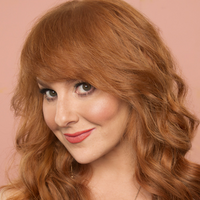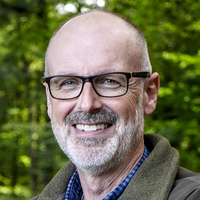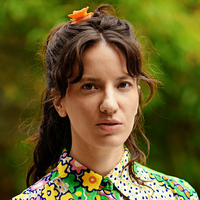As told to Eric Steuer, 2739 words.
Tags: Writing, Comedy, Podcasts, Beginnings, Mental health, Collaboration, Independence, Process.
On the joy of receiving feedback
Writer, comedian, podcaster, and actor Julie Klausner discusses the drive to create, the importance of unearthing new skills, and finding the right balance between isolation and connection.When did you first identify as someone who is funny?
I always sought the dopamine of people laughing at what I was doing. I did some performing as a little girl. I was on stage as a singer and I would be in musicals and things. I knew that I was compelling enough to be the center of attention in that particular way. But I remember realizing quickly how much more satisfying it was when people didn’t just tell you, “Oh, you can sing nicely,” but when you did something outrageous and it made people laugh.
What are some early memories you have of being outrageous?
I remember there was this video project we had to do in school. I got doused with a bucket of water and I was just so excited about it. I was so into the idea. It was a parody of a shampoo commercial, where it was like “This is how much you need when you use our shampoo. And this is how much you need when you use their shampoo.” I don’t know how in my mind I thought water would substitute for shampoo. All I know is I thought “Oh my god, it’d be so funny if this girl threw a bucket of water on me!”
I would draw cartoons, I would write dirty notes to my friends, I would do skits for them in my bedroom where I’d do things like stuff my bra. And as I’ve spoken about on my podcast, I also loved mooning my friends.
Where do you think that desire to make people laugh came from?
I was never popular and I always had challenges with fitting in and being easy-going about friendships. I’d have these friendships and then my best friend would want to hang out with someone else and I would just not take it well. I didn’t really have the social graces that are a necessary part of being well adjusted. So I was in my head a lot, and I felt like an outsider, and I think some of the desire to be outrageous came from that place.
There was also a grandiose narcissism of “I’ll show them one day. I’ll be famous for being funny.” Just that narcissistic black hole of hunger for approval. Because if you don’t get approval from your peers, it kind of rolls over to “Well, then the whole world is going to appreciate me.”
Is that something you still feel as an adult? The need to be loved and respected by the whole world for being funny?
I don’t particularly want to have the trait where I need people to pay attention to me and laugh at the things I say, but I do have it. I’m not necessarily proud of it.
How does that energy contribute to how you create?
It pushes me to make things, because I know that if I don’t do something that gets me published and I don’t get feedback of some kind, even if it’s small feedback, then I will have robbed myself of the very modest amount of joy that I have in my life.
There are few things that bring me true joy, not just comfort or pleasure, but joy. And one of them is performing and coming up with stuff and building on a bit or writing a joke or telling a joke or acting out a joke, and making people react. And that’s just the high that I have to chase.
Podcasting, as a creative form, requires a very particular type of performance. You’re there for an hour or more performing a version of yourself—one that’s got to be funny and “on” enough at all times to keep people engaged. How does it compare to the other kinds of creative work you do? Is it more tiring? Is it more fun?
Oh, it’s so much more fun. It’s so much easier. I grew up with a tremendous respect for broadcasters who did that type of thing. David Letterman was an indescribably important influence to me. I find what he’s able to do so remarkable, not just in terms of filling the time with his own personality, but the idea that he’s able to keep you company with this presentational form of who he is. And then at the same time, he’s there to amuse himself. There’s so much of Dave performing for Dave. I think he’s the master of that very specific art form.
And [Double Threat co-host] Tom Scharpling, to me, is someone like Letterman. Before I ever met him, I was a huge fan of his show, The Best Show. It was just him on the radio, with his personality, occasionally interacting with people, but often just talking to himself. I was just so dazzled by that particular skill, and I really wanted to see if I could do it.
I’d tried stand-up but I was really awful at keeping myself going. I was so lazy about memorizing my jokes and coming up with new ones. So the challenge of starting my first podcast, How Was Your Week?, was “Gee, I wonder if I could just talk to myself.” I didn’t know if I could.
It turned out to be something you’re really great at. How did that discovery change things for you?
Figuring out how to do extended improvised monologues and then evolving that into becoming a broadcaster or a podcaster or whatever you want to call it has unearthed a skill that I’m so grateful that I have. Because it has brought me more joy in its ease then anything else I’ve done. Just because it’s so natural for me to speak into a microphone. And so many of the other ways that I express myself are really hard for me to do.
A lot of the work you’ve done falls under the “hard to do” category. When it comes to, say, writing a book, do you find pleasure in the act of doing it? Or does the pleasure come when it’s done?
I’m one of those writers who loves having written. And this is a cliché, but you can handle it: I’m definitely one of those writers who really only starts to write when the pain of not writing is worse than the pain of writing. It’s like exercising.
There are moments when I’m writing and I figure something out and I say, “Oh, good for you, Julie.” But it’s never anything as pleasurable as it is when I’m performing. I’ve never laughed out loud writing a script or any prose to the point that it can compare with when you connect with someone live on something that’s really funny or surprising or exciting. Those moments are the best because they’re social. With writing, it’s just me and my fucking brain. And my brain does not always keep me the best company.
You’re your own boss, so you get to choose what you work on to keep yourself fulfilled and to keep yourself alive. That’s a total dream for a lot of people, but it has its challenges, too. For instance, how do you make sure you don’t burn yourself out?
Burning myself out isn’t really an issue. What I think of as an issue is my all or nothing attitude towards creating. I never feel like I’m doing enough. Ever. And I have a very hard time being content with any sort of middle ground. It’s very challenging for me to be able to step back and say, “Well, today I made some progress. I took a notes call on this screenplay, and I sent some emails about this play that I have an idea for, and I took a meeting about this podcast thing.” Unless I spent the entire day writing and I got to the end, I feel like shit. I feel like I did nothing.
And then even if I did write something and get to the end, then I think about what other people are doing and I get jealous or I get really hard on myself for not working harder. Not using my abilities to their full potential is something that I have always had as a major demon. And it’s very, very challenging to be alive when you have this belief system that says you’re just not productive enough.
How do you deal with that?
I think it comes down to paying close attention to my mental health. If you had a roommate that was as much of an asshole to you as you sometimes are to yourself, you wouldn’t be able to live with that roommate. So there’s a certain amount of acknowledging that, “We’ve got to figure out a better way here.” If I’m not able to change the particular belief system, then I’ve at least got to lower the volume a little bit.
There’s also an advantage to getting older—I just happen to be more tired. There’s something nice about being able to say “Oh good, it’s 7:00, time for me to watch a movie and do a crossword puzzle.” As opposed to “Where am I going tonight? What am I working on? What am I doing?” That doesn’t mean that I feel good about myself the next day, but there’s a certain amount of self soothing that I have to do just to stay alive as a human being that isn’t in constant distress.
Sometimes on Double Threat you’ll joke about not feeling productive enough. You do it for laughs on the show, in a self-deprecating way, but you can tell that it comes from a real place. It always bums me out because you do so many cool things, and lots of people, including me, love what you do. If you of all people don’t feel like you’re doing enough, then what hope is there for the rest of us?
It’s such a bad place to be. It’s also a side effect of isolation. Now, I believe every artist needs some isolation. A very important part of the creative process is being able to keep your own company and be alone. That is something that every creative person needs. I know there are people that will only write in a partnership or there are people that will only collaborate. But I think ultimately there is something that comes along with creativity that requires you to be alone sometimes.
But it really is a balancing act. Especially in the last year and a half with COVID, but also since Difficult People ended four years ago, I’ve had a really challenging time doing projects on my own. I’ve spent a lot of time alone trying to get projects completed and other projects off the ground. It’s hard. I know artists that have been beating themselves up, like, “Wow, I have all this time alone now. Why haven’t I written Moby Dick?” But everyone has to remember, we’re dealing with the very real social and physiological effects of isolation.
Oh yes, the effects are very, very real.
Right, and there’s also a limited amount of things you can do in isolation. I just want to give any other artists or creative people reading this the assurance that it’s been really hard for all of us. The isolation of the last year and a half has gone above and beyond the solitude that artists need to be productive. And it has bled into terrain that is unprecedented and challenging, not just on a personal level but on a creative level. And that’s not just for people that are performative in their work.
You talked before about how you really thrive on feedback, but since COVID, performing live in front of people has been so limited. How has that changed your relationship with social media?
What if I was just like, “Social media’s amazing”? What if I was just like, “Social media’s so great”
Who could argue with that?
I have no notes. Yeah. There’s nothing bad about it.
I mean, it’s just a bandaid really. Like Tom always says, the satisfaction that you get when you send a tweet and you get likes or feedback is similar to the satisfaction you get when you actually write a real thing and send it out into the world. So why would anybody want to write a book when they could just send a tweet? I definitely think there’s a junk food quality to it. And that also when you walk away from it, you realize, “Wait a minute. I have nothing. There’s nothing there that I can leave behind.” No one mentions your tweets in your obituary.
You must see an upside though, since you’ve stayed active online.
Yes, because I like thinking of a joke, a take on something everyone’s talking about, and sending it out. That’s just fun for me. There’s just something very simple and easy about that. I like writing jokes a lot. So when I’m able to write one, it’s nice to be able to just put it out and be direct about it. That’s my relationship to social media right now.
How interested are you in other kinds of digital tools? Has podcasting inspired you to create and distribute other kinds of work independently?
People were talking about this at the beginning of the pandemic too, the idea of shooting things yourself, editing them yourself, publishing them yourself. There’s no doubt that things are going to go in that direction as far as people being more entrepreneurial about publishing.
But I have a feeling you’re going to say that maybe it’s not 100% for you.
I mean, part of me wishes I was more ambitious and more energetic when it comes to that. But once you’ve had traditional media facilitate your stuff, you never want to go back. I don’t want to make Difficult People by myself. I don’t want to have to figure out casting and locations and lighting and all this stuff that I had been gifted. But I am impressed by people who are able to take the initiative to make stuff and put it on their own platforms.
Part of me just wonders: why am I waiting for these gatekeepers to give me an opportunity to make another show? And it’s because, well, I’m not well-acquainted with the alternative. Maybe that will have to change. Maybe I’ll have to shift towards figuring out how to self publish. Because one thing I know about myself is that there’s no semblance of happiness that is tenable to me without the ability to continue making things and putting them out into the world. That’s just not an option.
Julie Klaisner Recommends:
The TikTok account for Juicy Body Goddess, a plus-size boutique in North Carolina. The owner warmly greets every customer, “Welcome to Juicy Body Goddess, where you gotta be two-something to do-something!” I love her so much.
You Are Good: A podcast about movies through the prism of fatherhood and masculinity. It used to be called Why Are Dads? but now it’s a bit more expansive, ideologically. My friend Sarah Marshall, host of You’re Wrong About, hosts alongside Alex Steed and they have smart conversations with fabulous guests about movies that you’ve probably seen before. Check out The Texas Chainsaw Massacre one, or the Pretty in Pink episode featuring yours truly.
Rebecca Morgan’s artwork. I won’t indignify it by comparing it to other art, like R. Crumb or MAD magazine! I just won’t! But she takes the drag of femininity taken to grotesque, technicolor heights. Hilarious, sexy and deliciously childish.
Don Giller’s YouTube channel is rich to bursting with compilations of David Letterman’s best moments throughout his long career. You can watch every Chris Elliott appearance back to back, or all forty-ish hours of every Sandra Bernhard interview he’s ever done. I loved the Fran Lebowitz and Charles Grodin compilations, but I’d be lying if I said that his collections of Dave’s interactions with children didn’t get me through the pandemic alive. Start with this one.
I’m biased, but I can’t help recommending Tom’s amazing book, It Never Ends. Call it nepotism, I don’t care. Quality is quality.




